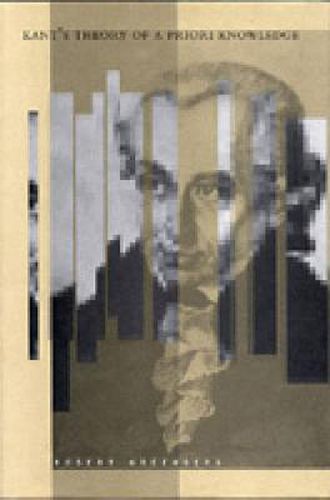Readings Newsletter
Become a Readings Member to make your shopping experience even easier.
Sign in or sign up for free!
You’re not far away from qualifying for FREE standard shipping within Australia
You’ve qualified for FREE standard shipping within Australia
The cart is loading…






The prevailing interpretation of Kant’s First Critique in Anglo-American philosophy views his theory of a priori knowledge as basically a theory about the possibility of empirical knowledge (or experience), or the a priori conditions for that possibility (the representations of space and time and the categories). Instead, Robert Greenberg argues that Kant is more fundamentally concerned with the possibility of a priori knowledge-the very possibility of the possibility of empirical knowledge in the first place.
Greenberg advances four central theses:(1) the Critique is primarily concerned about the possibility, or relation to objects, of a priori, not empirical knowledge, and Kant’s theory of that possibility is defensible; (2) Kant’s transcendental ontology must be distinct from the conditions of the possibility of a priori knowledge; (3) the functions of judgment, in Kant’s discussion of the Table of Judgments, should be seen according to his transcendental logic as having content, not as being just logical forms of judgment making; (4) Kant’s distinction between and connection of ordering relations (Verhaltnisse) and reference relations (Beziehungen) have to be kept in mind to avoid misunderstanding the Critique.
At every step of the way Greenberg contrasts his view with the major interpretations of Kant by commentators like Henry Allison, Jonathan Bennett, Paul Guyer, and Peter Strawson. Not only does this new approach to Kant present a strong challenge to these dominant interpretations, but by being more true to Kant’s own intent it holds promise for making better sense out of what have been seen as the First Critique’s discordant themes.
$9.00 standard shipping within Australia
FREE standard shipping within Australia for orders over $100.00
Express & International shipping calculated at checkout
The prevailing interpretation of Kant’s First Critique in Anglo-American philosophy views his theory of a priori knowledge as basically a theory about the possibility of empirical knowledge (or experience), or the a priori conditions for that possibility (the representations of space and time and the categories). Instead, Robert Greenberg argues that Kant is more fundamentally concerned with the possibility of a priori knowledge-the very possibility of the possibility of empirical knowledge in the first place.
Greenberg advances four central theses:(1) the Critique is primarily concerned about the possibility, or relation to objects, of a priori, not empirical knowledge, and Kant’s theory of that possibility is defensible; (2) Kant’s transcendental ontology must be distinct from the conditions of the possibility of a priori knowledge; (3) the functions of judgment, in Kant’s discussion of the Table of Judgments, should be seen according to his transcendental logic as having content, not as being just logical forms of judgment making; (4) Kant’s distinction between and connection of ordering relations (Verhaltnisse) and reference relations (Beziehungen) have to be kept in mind to avoid misunderstanding the Critique.
At every step of the way Greenberg contrasts his view with the major interpretations of Kant by commentators like Henry Allison, Jonathan Bennett, Paul Guyer, and Peter Strawson. Not only does this new approach to Kant present a strong challenge to these dominant interpretations, but by being more true to Kant’s own intent it holds promise for making better sense out of what have been seen as the First Critique’s discordant themes.